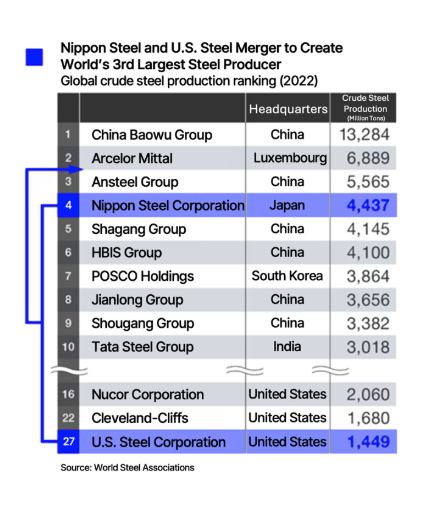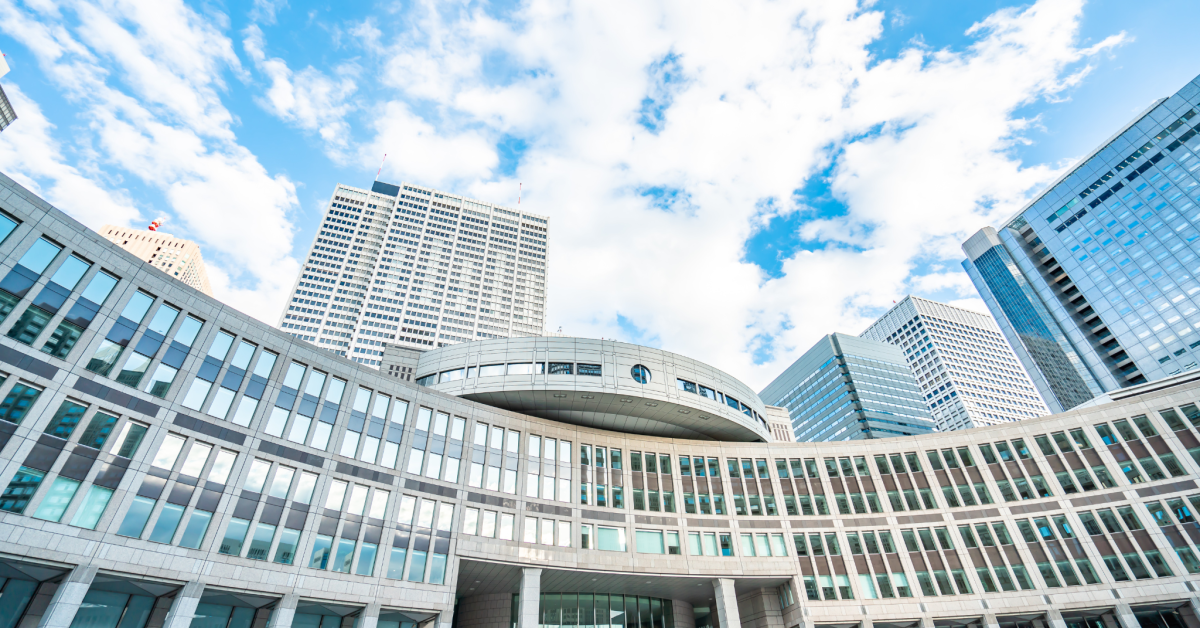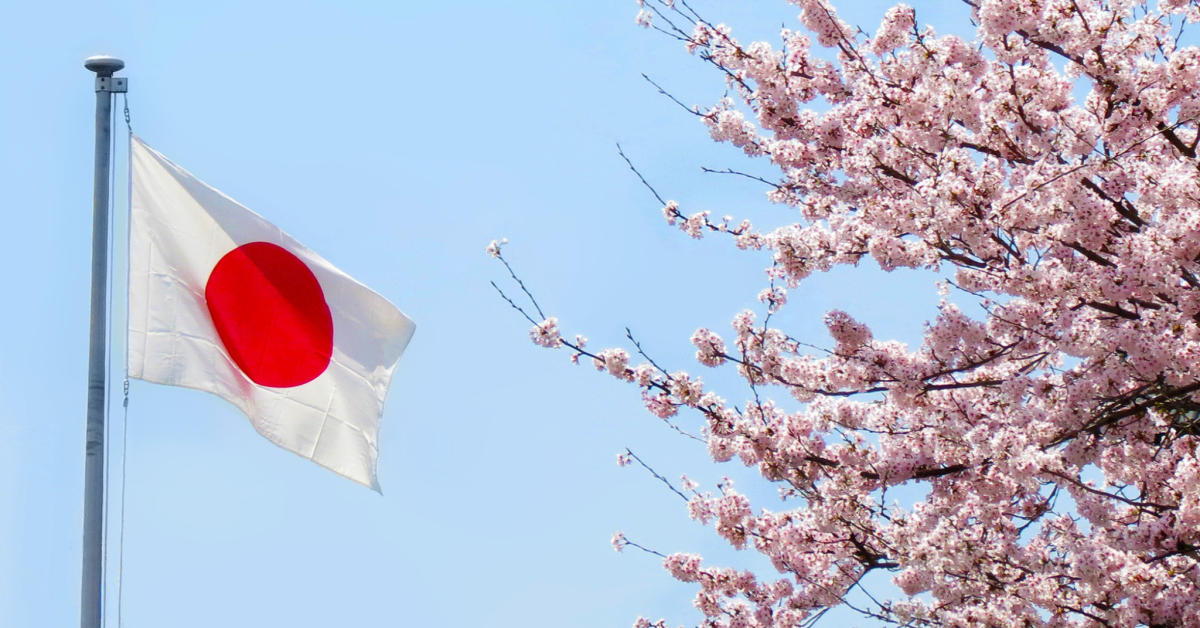The Ongoing Saga of Nippon Steel’s Acquisition of US Steel
The Critical Importance of Factoring “Political Risk” into Cross-Border Investments
Overview
Nippon Steel’s attempt to acquire US Steel has become a significant case in Japan-US economic relations. It raises critical questions about national security versus global competitiveness, cross-border investment risks, political influence on business, and geopolitical strategy.
Announced in December 2023 as a USD 15 billion deal to boost global competitiveness, the merger faced growing opposition due to US national security concerns. Despite Nippon Steel’s promises to protect US jobs and facilities, President Biden officially blocked the acquisition in January 2025. In response to this, Nippon Steel and US Steel jointly filed a lawsuit against Biden.
Japanese Prime Minister Ishiba has likewise expressed his concerns, and it will likely be raised as an agenda item at the summit meeting with new President Trump, likely to be held in the first half of February. At this point, however, Trump is also opposed to the acquisition.
The ongoing saga, involving legal battles and political debates, has sparked concerns among Japanese investors about future cross-border investments in the US. This case demonstrates that Japanese companies must be extremely cautious about investing in sectors relating to “national security”—actual and perceived—such as steel, food, energy and electricity, mineral resources, water, aerospace and cutting-edge semiconductors, and “politically important cities and states.”
This incident has also instilled in Japanese business leaders an awareness of “new political risk.” From now on, political risk should be more strongly recognized when investing in developing and developed countries—in the US and beyond. Japanese business leaders still strongly believe that “politicians make the rules” and that “we should not get involved in politics,” but now is the time for them to prepare to face political risk and act.
Background and Timeline
The Road to the Acquisition Attempt
In December 2023, Nippon Steel Corporation, Japan’s largest steel producer, announced plans to acquire United States Steel Corporation (US Steel) for approximately USD 15 billion, committing to maintaining US Steel’s name, its headquarters in Pittsburgh, and to honoring all existing union contracts. Nippon Steel, the world’s fourth largest steel producer, and US Steel, the world’s 27th largest (ranked third in the US), could together form the third largest steel producer in the world.

Supporters of the acquisition stress that the merger would enhance US Steel’s global competitiveness and revitalize its aging facilities while leveraging Nippon Steel’s advanced technologies and resources. The acquisition also presents an opportunity for Nippon Steel to share its cutting-edge decarbonization technologies with US Steel, which would help the US to meet its sustainability goals. Furthermore, the partnership between major steel companies of close allies has geopolitical implications for supply chain strategies amid Chinese companies’ dominance in the steel industry. Yet opponents, including the United Steelworkers (USW) union, claim that the acquisition harms US national security. They further raise concerns that the acquisition will undermine domestic ownership.
Timeline
December 18, 2023: Nippon Steel and US Steel publicly announce their definitive agreement for the acquisition. The deal is positioned as a strategic move to enhance global competitiveness and innovation in the steel industry.
Early 2024: The proposed acquisition is scrutinized by various stakeholders, including USW, which expresses concerns over potential impacts on American jobs and the domestic steel industry. Political figures, including then-President Joe Biden and then-candidate Donald Trump, voice opposition, citing national security concerns.
March 14, 2024: President Biden publicly states that US Steel must remain domestically owned and operated, signaling a major obstacle to the acquisition.
Mid-to-Late 2024: To alleviate concerns, Nippon Steel makes several concessions, including offering the US government a veto over any reduction in US Steel’s production capacity and committing to additional investments in US facilities. Despite these efforts, the Committee on Foreign Investment in the United States (CFIUS) reviews the deal but fails to reach a consensus.
December 23, 2024: CFIUS concludes its review without a unanimous decision, escalating the matter to President Biden for a final determination.
January 3, 2025: President Biden issues an executive order blocking Nippon Steel’s acquisition of US Steel, citing national security concerns and the necessity of preserving a strong, domestically owned steel industry.
January 11, 2025: Nippon Steel and US Steel announce that CFIUS has extended the deadline for Nippon Steel to abandon the acquisition bid from February 2 to June 18, 2025. This allows US Steel and Nippon Steel to address political and regulatory concerns and potentially revive the deal.
January 13, 2025: US steel manufacturer Cleveland-Cliffs’ CEO, Lourenco Goncalves, called Nippon Steel’s acquisition efforts “misguided” in a scathing attack on Japan, which he called “evil” and “far worse than China.” He reiterated his intentions to acquire US Steel.
Stakeholder Reactions
Nippon Steel and US Steel React to Biden’s Decision
Nippon Steel and US Steel issued a strongly worded joint statement expressing disappointment with President Biden’s decision to block their proposed acquisition. The statement criticized the process as being “manipulated to advance President Biden’s political agenda,” asserting that it undermines due process and the potential national security benefits of the deal (Nippon Steel). They highlighted the transaction’s potential to secure US Steel jobs, revitalize aging facilities with billions in committed investments, and enhance competitiveness against China. The companies vowed to take legal action to protect their rights and emphasized their commitment to pursuing business in the US to benefit stakeholders and local communities. Nippon Steel and US Steel filed lawsuits against the Biden administration, alleging unlawful interference and due process violations.
David B. Burritt, US Steel President and CEO, said President Biden’s stance was a shameful and politically motivated decision and emphasized US Steel’s commitment to fight what he described as political corruption. Burritt highlighted the importance of investment for the future of US Steel and the nation (US Steel).
Nippon Steel’s CEO, Eiji Hashimoto, strongly opposed President Biden’s decision, calling the intervention “illegal” and “politically motivated.” He expressed his commitment to pursuing the deal, saying, “We will never give up on growing our US operations. There is neither a reason nor a need to.” Hashimoto believes there is still a chance they can win (Mainichi).
In an opinion piece for The Wall Street Journal, Nippon Steel Vice Chairman Takahiro Mori wrote: “Biden’s decision to block our acquisition of US Steel appears to be driven more by electoral politics than genuine national security concerns. Japan is a close ally of the United States, and this raises a fundamental question: Will major companies from allied nations be treated as partners or political pawns when they seek to invest in America?” (Wall Street Journal).
United Front: Bipartisan Stance on the US Steel Deal
President Biden’s decision to block Nippon Steel’s acquisition of US Steel has highlighted bipartisan concerns over national security and the importance of maintaining a domestically controlled steel industry. Biden emphasized that US Steel is vital to the country’s infrastructure, automotive sector, and defense industrial base, stating, “Allowing the acquisition would place a major US Steel producer under foreign control, posing risks to national security” (White House). The Washington Post reported that President Biden’s decision to block Nippon Steel’s acquisition of US Steel overrode the advice of key advisers, including Secretary of State Antony Blinken, US Ambassador to Japan Rahm Emanuel, Treasury Secretary Janet Yellen, and National Security Adviser Jake Sullivan, who raised concerns about the potential strain on US-Japan relations and questioned the national security rationale (Washington Post).
President-elect Donald Trump echoed Biden’s sentiments in a post on January 6, questioning the timing of the sale and emphasizing US Steel’s potential resurgence under American ownership: “Wouldn’t it be nice to have US Steel, once the greatest company in the World, lead the charge toward greatness again?” (Truth Social).
This decision has garnered rare bipartisan agreement, with lawmakers from both parties expressing support for keeping US Steel under domestic ownership. Several members of Congress cited steel's strategic importance in maintaining national security and supply chain resilience. This cross-party consensus reflects a broader trend toward prioritizing economic and industrial sovereignty in the face of global competition.
Japanese Leaders React: Concerns Over Biden’s Block of the Acquisition
At a press conference on January 6, Prime Minister Ishiba emphasized the importance of addressing Japan’s industrial sector’s concerns about Japan-US investment relations following the US government’s decision. While refraining from commenting on the specifics due to the matter being under US domestic legal review, he urged the US government to provide a clear explanation for its national security concerns. Ishiba stressed that resolving these issues is crucial for the future of the Japan-US alliance and economic relationship (Prime Minister’s Office of Japan).
During a Japan-US foreign ministers’ meeting on January 7, Foreign Minister Iwaya raised the issue with US Secretary of State Blinken, who was visiting Japan. Iwaya stated: “We believe that investment from Japan to the United States benefits both countries. Therefore, it is extremely disappointing that, despite support from some US Steel workers, the decision was made to block the acquisition over national security concerns” (MOFA).
Japanese business leaders and economic organizations have voiced significant concern over former President Biden’s decision to block Nippon Steel’s acquisition of US Steel. Masakazu Tokura, Chairman of the Japan Business Federation (KEIDANREN), described the move as “extremely regrettable,” emphasizing, “The US has grown through free and open trade and investment.” KEIDANREN further expressed hope that the review procedure would be conducted with integrity and fairness in accordance with the law, as the decision has garnered considerable interest among Japanese companies considering investments in the US (KEIDANREN). Similarly, Takeshi Niinami, Representative Director of the Japan Association of Corporate Executives (KEIZAI DOYUKAI), called the potential acquisition a positive step for US industrial revitalization and questioned the rationale behind the US government’s stance.
Echoing these sentiments, Minister of Economy, Trade, and Industry (METI) Muto criticized the decision, stating, “It is extremely regrettable and difficult to understand that such a judgment was made on the grounds of national security” (TBS). Business leaders also expressed unease, with DeNA Chairperson Tomoko Namba expressing a sense of betrayal, saying, “As private companies, we trusted the US, but now we feel let down. This highlights the need to consider political risks in sectors like IT.” However, some, like NTT President Akira Shimada, emphasized the continued importance of the US market despite the controversy. Overall, the reaction underscores growing unease about the impact of political decisions on cross-border investments and Japan-US economic relations (Nikkei).
What We're Watching
What Lies Ahead for Nippon Steel and US Steel
The Legal Battle
On January 6, Nippon Steel and US Steel have jointly filed two lawsuits. The first is against former President Biden and senior administration officials, alleging “unlawful political influence” under the guise of protecting national security and seeking a reassessment of the deal by CFIUS. The second lawsuit targets USW and Cleveland-Cliffs, accusing them of leveraging their longstanding alliance to obstruct the deal through regulatory and political channels. Both lawsuits are expected to involve lengthy legal proceedings, potentially giving Nippon Steel and US Steel additional time to pursue high-level political negotiations.
Also on January 6, The New York Times reported that the companies’ legal challenge is a bold but unlikely effort to salvage the deal, which has undoubtedly become entangled in election-year politics. With presidents holding broad authority to define national security threats, no court has ever overturned a decision to block a transaction under these powers (New York Times). However, this is only the ninth time a president has used CFIUS to block a foreign transaction and, notably, the first instance where the target lacks Chinese ownership ties. This no doubt raises concerns about potential risks to the United States’ global economic standing (The Atlantic Council).
The new Trump administration
Under the new Trump administration, Nippon Steel’s acquisition of US Steel could be reassessed, especially with Mike Pompeo, a key advisor to Nippon Steel, urging support for the deal (Fox News). Pompeo, who was CIA director under the first Trump administration, argues that the acquisition would strengthen the US steel industry and competitiveness against China. “Instead of just looking at national security risks, of course, there’s none—it’s an ally, Japan, that’s going to invest in America, make steel here in America, build in America,” Pompeo stated. This second Trump administration might consider renegotiating terms to address national security concerns, such as safeguarding US jobs and production capacity or conducting a new security review. However, given Trump’s prior opposition to the deal, significant concessions would likely be needed to secure approval.
Still, US Steel CEO David Burritt believes there is room to appeal to President Trump’s business sensibilities, stating that Trump is “a smart guy” (NBC News). In addition, this merger is backed by the support of several mayors in the Mon Valley, US Steel’s 1901 birthplace, who met with Nippon Steel Vice Chairman Takahiro Mori on January 6 and have vowed to take this case to President Donald Trump.
Ishiba-Trump relations
On January 21, Foreign Minister Iwaya had his first meeting with Secretary of State Marco Rubio and conveyed that Japan has been the largest investor in the US for five years in a row. As Japan intends to continue to expand its investment, Foreign Minister Iwaya asked the US to dispel concerns and worries about investment from Japan in the US (MOFA).
The next milestone will be the discussion between the two leaders. Prime Minister Ishiba needs to secure a meeting with President Trump as early as possible. He must convince President Trump that Nippon Steel’s acquisition of US Steel does not undermine but rather contributes to the US economy by protecting the employment of workers, the local economy that relies on a thriving US Steel, and, of course, the US steel industry.
Business Implications
Japanese businesses may reconsider investments in the US, highlighting the importance of clear, predictable trade policies. Leaders of various Japanese companies have expressed regret over former President Biden’s decision to block Nippon Steel’s buyout of US Steel. The US is Japan’s closest and long-standing ally, so the decision has left many Japanese business leaders shocked and disappointed. However, they hope the US will eventually rectify what they perceive as an unfair move. While this incident may not lead to an immediate withdrawal of Japanese investment in the US, the broad interpretation of national security raises concerns. It poses a destabilizing factor in shaping future investment plans.
Companies must thoroughly evaluate sectors considered politically sensitive before investing. They must be extremely cautious about investing in sectors related to “national security”—broadly defined—and “politically important cities and states.” The US definition of “national security” may include critical sectors beyond steel, including food, energy and electricity, mineral resources, water, aerospace, and cutting-edge semiconductors. Japanese companies will also have to be very careful about investing in swing states, which are susceptible to party politics (the headquarters of US Steel is located in Pittsburgh, Pennsylvania, one of the swing states).
Incorporating political risk analysis into investment strategies is now essential. This incident has flagged for Japanese business leaders the gravity of “new political risk.” Until now, political risk has been a source of concern mainly when investing in developing countries, particularly in the Global South. However, investing in developed countries, including the US, is increasingly a factor in the risk calculus. Even if economic risks are mitigated through due diligence, unresolved political risks could derail investments.
Strategic engagement with key stakeholders is key to business success in foreign markets. Japanese business leaders often avoid political involvement. However, the evolving landscape necessitates proactive engagement to address new political risk—developing well-planned strategies and engaging with key city, state, and federal stakeholders. For example, Masayoshi Son, CEO of SoftBank Group, visited President Trump’s home in Florida immediately after Trump’s victory in the presidential election and, having gained President Trump’s backing, announced that he would be investing USD 100 billion in the US. Heightened political risk may also mean new opportunities for business leaders who are unafraid to address political risk and build trust-based relationships with key stakeholders.
Materials presented by Edelman's public & government affairs experts. For additional information, reach out to Yuichi.Kori@Edelman.com or Richard.Andrew@Edelman.com.



